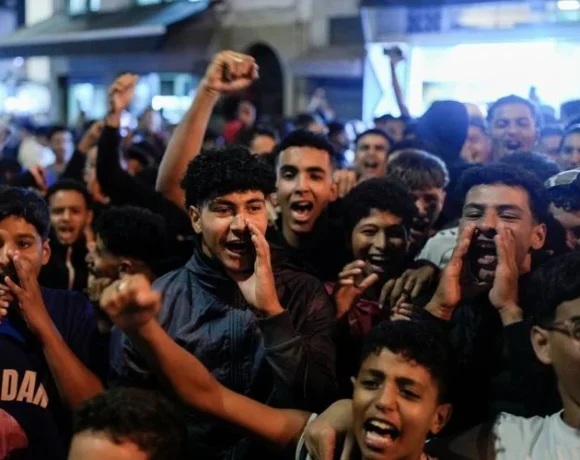Africa’s Strategic Role in Global Food Security within the India-Africa Economic Corridor (IMEC)

Israel
Opinion by Samuel Shay, Entrepreneur and Senior Economic Advisor to the Abraham Accords Treaty
The India-Africa Economic Corridor is envisioned as a new axis of prosperity that connects Asia, Africa, and the Middle East through a unified framework of trade, infrastructure, and technological cooperation. Beyond its logistical and industrial potential, the corridor holds a far deeper strategic goal: securing food for a growing global population and transforming Africa into the beating heart of the world’s food supply system.
Africa as the World’s Agricultural Engine
Africa’s agricultural potential is unmatched. With 60% of the planet’s uncultivated arable land, abundant water basins, and a youthful labor force, the continent has all the natural elements required to become the world’s largest food producer. Yet, due to underinvestment, poor logistics, and outdated farming methods, Africa imports over $40 billion worth of food annually. This paradox must be reversed.
The India-Africa Corridor can serve as the structural framework to unlock this potential. By combining Indian expertise in high-yield farming, Israeli water technologies, and Gulf capital investment, vast tracts of African land can be transformed into productive agricultural zones. From the Nile Basin to the Great Rift Valley and the West African savannas, modernized farms can produce rice, maize, wheat, vegetables, and livestock products for both local consumption and export.
Key initiatives include:
- Establishing smart agricultural zones integrated with solar energy, AI-based irrigation, and satellite crop monitoring.
- Creating agro-industrial parks where local farmers can process and package their produce to add value before export.
- Developing seed banks and biotechnology centers to adapt crops to local climate conditions and improve resilience against drought and pests.
When Africa becomes a large-scale supplier of food commodities, it will not only secure its own stability but also serve the entire corridor stretching from India through the Middle East to Europe.
Food Security as the Foundation of Regional Stability
Food insecurity is one of the most direct triggers of social unrest, extremism, and political instability. In many African regions, poverty and hunger drive migration, conflict, and the rise of insurgent groups. Addressing these root causes through food production is far more effective than military intervention.
Establishing self-sustaining food systems will enable African nations to stabilize communities, reduce dependency on aid, and create local wealth. Small-scale cooperative farms can operate alongside industrial-scale projects, ensuring that every village contributes to the national food grid. When citizens have stable access to food and income, extremism loses its foundation.
Furthermore, these initiatives will promote regional trade integration under frameworks like AFCFTA (African Continental Free Trade Area), enabling surplus crops to move efficiently between regions with different production and consumption needs.
The India – Africa Partnership: A Model for Sustainable Development
India’s agricultural transformation offers a valuable blueprint. Through the Green Revolution and decades of innovation in agro-tech, India has developed cost-effective systems for water management, seed engineering, and rural financing. These solutions are perfectly suited for African conditions, where similar environmental and demographic challenges exist.
Under the corridor framework, India can partner with African governments to establish joint agricultural training centers and digital platforms for crop management and supply-chain monitoring. Mobile-based tools can connect farmers directly with markets, allowing them to sell their products without middlemen.
At the same time, Gulf states such as Saudi Arabia, Qatar, and the UAE bring vast investment capacity, logistics networks, and experience in food import diversification. Their sovereign funds can finance mega-farms, cold storage facilities, and distribution networks. In return, these nations will gain reliable food sources closer to home, reducing their vulnerability to global supply shocks.
Israel’s contribution lies in its desert agriculture, water recycling, and precision irrigation technologies. By integrating these systems with Indian machinery and Gulf capital, Africa’s agricultural infrastructure can be modernized within a decade.
The Logistics Nexus: Linking Farms to Markets
Food security does not end with production; it depends on the ability to move goods efficiently from farms to consumers. The India-Africa Corridor will serve as a multimodal transport spine combining ports, railways, highways, and digital logistics systems.
New trade routes connecting East African ports (Mombasa, Dar es Salaam) with Red Sea gateways (Port Sudan, Jeddah) and Mediterranean hubs (Haifa, Port Said) will reduce transportation times from weeks to days. This efficiency minimizes food loss and ensures freshness.
By creating cold chain networks , temperature-controlled logistics systems, countries will be able to export perishables such as fruits, vegetables, dairy, and meat with minimal waste. Artificial intelligence will optimize routing and storage, cutting costs and carbon emissions.
Additionally, digital trade platforms supported by blockchain technology can authenticate origin, quality, and sustainability standards, ensuring fair trade and transparency across the corridor.
A Multi – Trillion-Dollar Economic Framework
The projected value of trade and investment along the India-Africa Corridor ranges between two and four trillion dollars over the next five years. This figure includes infrastructure projects, energy facilities, agricultural production, and industrial parks.
Agriculture alone could account for over 20% of the corridor’s economic output. The establishment of food processing zones, logistics terminals, and renewable-powered irrigation systems will generate millions of jobs and attract private investors.
By linking village-level projects into national and regional systems, Africa can build an integrated food economy that supports urban centers and exports simultaneously. This network effect will multiply economic output, strengthen currencies, and reduce dependency on imported food staples.
Strategic, Humanitarian, and Environmental Implications
Beyond the economic dimension, the food security initiative carries deep humanitarian and environmental significance. Empowering local farmers through education and technology is an investment in human dignity. It transforms aid-dependent populations into self-reliant producers.
Environmental sustainability will be ensured by adopting climate-smart agriculture, renewable energy for irrigation, and reforestation programs that reduce soil erosion and carbon emissions. The synergy between agriculture, clean energy, and water recycling will establish a circular economy model for rural development.
Moreover, securing Africa’s food supply contributes directly to global security. By reducing hunger-driven migration and strengthening governance in vulnerable regions, the corridor supports peace and long-term geopolitical stability.
The Role of the Gulf and Israel as Strategic Anchors
The Gulf states and Israel represent the connecting bridge between Africa and Asia in this corridor. They control critical maritime routes, possess capital and technological infrastructure, and hold the political leverage to align multi-national cooperation.
- Saudi Arabia can lead the food security fund, financing mega-agro projects across Africa.
- Qatar can focus on education and agricultural innovation centers.
- The UAE can provide logistics, ports, and digital trade systems.
- Israel can deliver high-precision agro-tech solutions, desert cultivation models, and water-saving systems.
Together, they create a strategic triangle connecting African resources, Gulf financing, and Asian markets, a model of 21st century economic diplomacy.
Conclusion: Africa as the Foundation of Global Food Security
The India-Africa Economic Corridor offers a realistic, scalable, and inclusive solution to one of humanity’s greatest challenges: feeding a growing population while preserving the planet’s resources.
Africa stands at the center of this transformation. With coordinated investment, technology transfer, and intercontinental cooperation, the continent can evolve from a region of agricultural potential into a global powerhouse of food security.
This is not merely a development project; it is a civilizational mission. A mission to ensure that no child goes hungry, that every farmer becomes a stakeholder in prosperity, and that trade between nations becomes a force for peace rather than competition.
Africa is not just the future of food; it is the foundation upon which global stability and human progress will stand.









